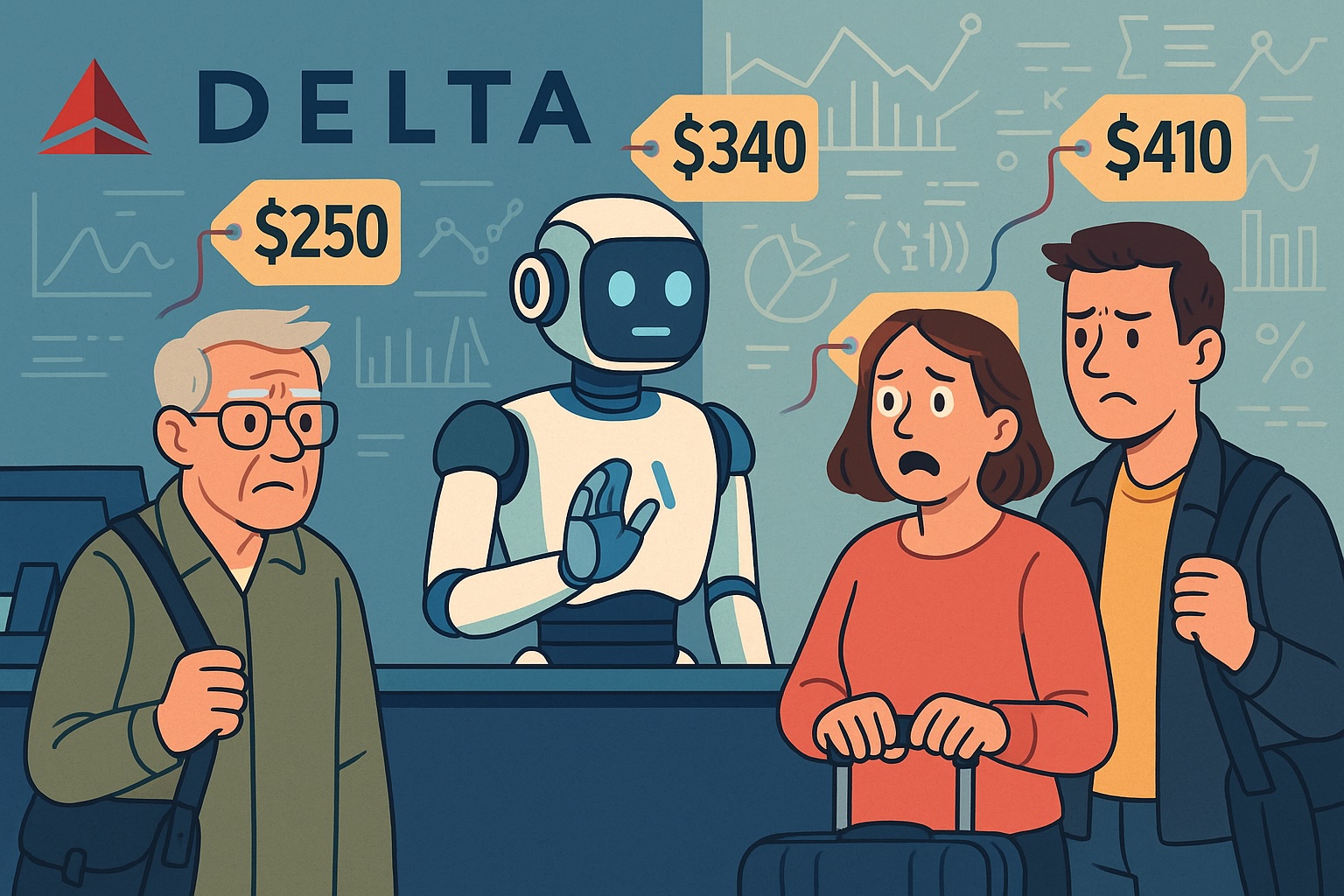Delta is the latest in a series of companies which will use AI for individual pricing models in order to extract as much money as they can from each customer.

I’ve often said I’m not afraid of my government having my data, but I’m very afraid of businesses having it. The reason is the government has a lot more restrictions on what it can do, and also because businesses impact our daily lives hundreds of times a day, from the food we eat to the clothes we wear to how we spend our free time. (To be fair, I also didn’t expect the government of the United States to be actively hostile to its citizens, so that's on me.)
Case in point is Delta’s new plan to use AI for ticket pricing. Note that they’ve been attempting this with machine learning (which is a type of AI) for years. It’s not clear from the articles whether machine learning got good enough or if newer types of AI like LLMs are involved. Which technology they are using is moot, however. (It should also be noted Delta is not the first to do this. McDonald’s prices based on location, online shoppers get different prices, and even Starbucks has been doing this.
What does matter is that they can use your data against you. Specifically, they can decide that you should be paying a higher price than someone else for the exact same product. It’s likely based on what you paid for past tickets. But today or in the future, it could also be more. At the grocery store did you buy the premium brands or the cheaper ones? Did you use coupons? And was that grocery store high-priced Whole Foods or discount chain Aldi?
Those are nice vacation photos you put on social media, I’d guess that’s at least a four-star hotel, so an extra $200 per seat should be affordable for you, right? Oh, and is that a designer dress you’re wearing in the photo? I assume you bought it and didn’t borrow it from your friend, doesn’t matter, pay up. I looked up your friends and found their zip codes. You might be living in Koreatown in LA, but your friends come from high-income zip codes like Beverly Hills, so I’m guessing you’ve got more money than someone might first surmise. Thankfully, AI can dig deep to find these types of financial signals. (You may recall the famous story of how Target recognized that a teenage girl was pregnant—before her father did.)
You may have read stories about AI threatening to blackmail people. (It’s also been known to give instructions for murder and self-mutilation.) In the articles like this one from the BBC threats of blackmail were employed to prevent AI from being shut down, but if blackmail is a viable tactic, where’s the line? Are you saying we trained AI to only resort to blackmail then, but not other times? If AI needs to help increase profits to a company, it might even recognize that if it doesn’t do a good job, it will be replaced, so blackmail seems to fall into its arsenal once again.
Why do I mention blackmail? Because even though you live in a given town and have two kids (which AI knows because you’re buying diapers for an infant and for a two-year-old and have “date night with wife” every month on your calendar) you also seem to be buying condoms and wine two towns over while your phone pings from a motel there. Or maybe you were just out with your mistress at a Coldplay concert and while you didn’t panic when up on camera AI is still going to scan the video and the facial recognition will not match your wife. However, AI discovers it for your next family vacation, pay an extra $250 per ticket or else!
It seems like something out of a movie, but all the pieces are there. AI does use blackmail, AI will use data against you, companies share data. That may be an extreme case, sure, but it’s not that far off. Amazon doesn’t even have to go outside its own walls. If you’re buying expensive meat at Amazon owned Whole Foods, then Amazon Pharmacy may jack up prices on your cholesterol medication. (And before you say your insurance pays for prescriptions, let me remind you of Amazon One Medical.) Conglomerates really are more efficient . . . at taking advantage of your data trail.
And this is assuming it’s just bucketing you based on how much money it thinks you have. As I wrote in “Redlining in the Twenty-First Century: Everything Everywhere All at Once” we may charge people different prices based on race, religion, or other factors we’re not supposed to consider and suddenly we’re back to redlining and discrimination.
Society needs to act today to limit the use of data in this way. That slope is very slippery and the window to prevent it won’t stay open long. Once companies go down this path, they’ll have the money and possibly direct, AI-guided political influence (or maybe just straight up blackmail) so that when we try to fix it once it’s in place, it will be too late.
I suppose we could ask AI itself to tell us how to stop it, but I’m 99% sure the answer will be, ”I’m sorry Dave, I’m afraid I can’t do that.”
It’s critical to learn about corporate culture before you accept a job offer but it can be awkward to raise such questions. Learn what to ask and how to ask it to avoid landing yourself in a bad situation.
Investing just a few hours per year will help you focus and advance in your career.
Groups with a high barrier to entry and high trust are often the most valuable groups to join.